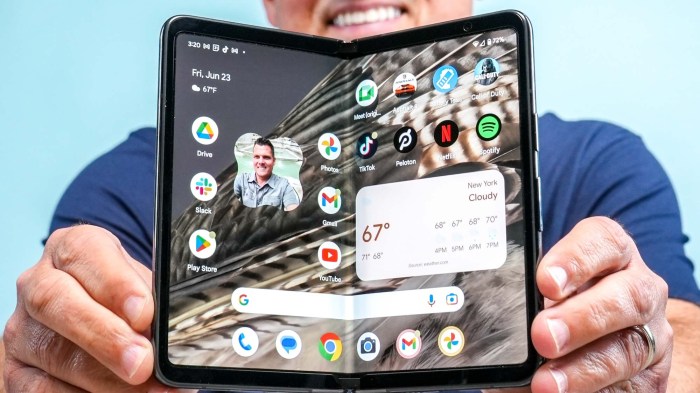The best fold smartphone is more than just a novelty; it’s a revolution in how we use our mobile devices. These innovative devices offer a larger screen experience, enhanced productivity, and a unique user experience. But with a wide range of models and features, finding the right foldable phone for you can be overwhelming. We’ll delve into the key features, top models, and future trends to help you make an informed decision.
Foldable smartphones have come a long way since their initial introduction. Early models suffered from durability issues and high prices, but recent advancements have addressed these concerns, making them a more viable option for mainstream consumers. From the sleek clamshell designs to the larger, tablet-like experiences, there’s a foldable phone out there for everyone.
Top Foldable Smartphones: Best Fold Smartphone
Foldable smartphones have taken the tech world by storm, offering a unique blend of portability and expansive screen real estate. These devices are constantly evolving, with new models boasting impressive advancements in display technology, performance, and durability.
Top Foldable Smartphones, Best fold smartphone
This table showcases some of the top-rated foldable smartphones available today, highlighting their key features, pros, and cons:
| Model | Key Features | Pros | Cons | Price | Release Date | Availability |
|---|---|---|---|---|---|---|
| Samsung Galaxy Z Fold5 |
|
|
|
$1,799 | August 2023 | Widely available |
| Google Pixel Fold |
|
|
|
$1,799 | June 2023 | Limited availability |
| Oppo Find N2 Flip |
|
|
|
$899 | December 2022 | Limited availability |
| Samsung Galaxy Z Flip5 |
|
|
|
$999 | August 2023 | Widely available |
Future Trends and Innovations
The world of foldable smartphones is rapidly evolving, with advancements in display technology, hinge mechanisms, and software optimization driving the next generation of devices. These innovations promise to deliver even more immersive experiences, greater durability, and seamless integration into our digital lives.
Display Materials
The quest for more durable and flexible displays is a key focus in foldable smartphone development. Current models primarily utilize flexible OLED panels, but ongoing research explores alternative materials with enhanced properties.
- Ultra-Thin Glass (UTG): This material offers increased scratch resistance and durability compared to plastic, making it ideal for foldable screens. Companies like Samsung and LG are actively incorporating UTG into their foldable devices.
- Polyimide (PI) Films: PI films are known for their flexibility, transparency, and high temperature resistance. They are already used in some foldable displays, but researchers are exploring ways to improve their durability and reduce their thickness.
- Quantum Dot (QD) Displays: QD technology offers vibrant colors and high contrast, potentially revolutionizing foldable screen visuals. Samsung has already incorporated QD displays into its flagship foldable phones, showcasing the potential of this technology.
Hinge Mechanisms
Hinge design is crucial for the longevity and reliability of foldable smartphones. Advancements in hinge technology aim to improve durability, reduce creases, and enhance the overall user experience.
- Water-Drop Hinge: This design, pioneered by Samsung, features a more compact and smoother hinge mechanism. It reduces the visible crease and offers improved durability compared to previous generations.
- Multi-Foldable Hinges: Researchers are exploring multi-foldable hinge mechanisms, allowing for even more compact designs and the ability to fold the device into multiple configurations.
- Self-Healing Materials: Integrating self-healing materials into hinge mechanisms could further enhance durability by repairing minor scratches and tears, extending the lifespan of foldable devices.
Software Optimization
Software optimization is critical for maximizing the potential of foldable displays. Developers are working on innovative software solutions to take advantage of the unique form factor and provide seamless user experiences.
- Adaptive User Interfaces (UIs): Software developers are creating adaptive UIs that dynamically adjust to the unfolded and folded states of the device, optimizing app layouts and content display for each configuration.
- Multi-Window Functionality: Foldable phones offer the potential for multi-window functionality, allowing users to run multiple apps simultaneously on different parts of the screen.
- Enhanced Productivity Features: Software advancements are bringing new productivity features to foldable devices, such as the ability to seamlessly drag and drop content between apps and use multiple virtual desktops.
Final Wrap-Up
As foldable smartphone technology continues to evolve, we can expect even more innovative designs, enhanced durability, and improved user experiences. The future of mobile devices is undoubtedly intertwined with foldable technology, offering a glimpse into a world where our phones can seamlessly adapt to our needs. Whether you’re a tech enthusiast looking for the latest innovation or simply seeking a larger screen experience, exploring the world of foldable smartphones is a worthwhile endeavor.
Choosing the best fold smartphone can be a tough decision, but it’s worth considering the flexibility of using a pay as you go unlocked smartphone while you’re on the go. This way, you can easily switch carriers and plans without being tied to a contract.
With a pay-as-you-go plan, you’ll only pay for what you use, making it a great option for those who don’t use a lot of data or talk time. Ultimately, the best fold smartphone for you will depend on your individual needs and preferences.
 Informatif Berita Informatif Terbaru
Informatif Berita Informatif Terbaru
